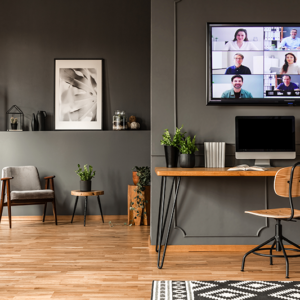Back to work or work from anywhere
The workplace is rapidly evolving, and technology is at the forefront of this transformation. From artificial intelligence and virtual reality to the Internet of Things (IoT) and blockchain, the future of workplace technology is poised to revolutionize the way we work.
Automate Workplace Technology
Automation is one of the most significant changes in the workplace, and it’s only getting more sophisticated. The rise of robotics and machine learning could streamline processes and reduce costs, but also potentially lead to job loss, or job augmentation. This doesn’t necessarily mean that you will “lose your job to a robot” but your job will be supplemented by computers. Automation also helps AV users better understand how their spaces are used. Installing cameras into your video conferencing systems that can also do people counting or some form of occupancy sensors allows facilities and IT to determine how often a room is being used.
Letting the Robots Do It
Virtual and augmented reality technologies are also making waves in the workplace, as they offer new ways to train and develop employees. Imagine workers practicing dangerous or complex tasks in a safe, controlled VR environment, or receiving real-time guidance and assistance through AR.
Artificial intelligence is already being used in a variety of ways in the workplace, from chatbots that assist with customer service to algorithms that help companies make better hiring decisions. But as with any new technology, ethical considerations around AI and job displacement are crucial.
The Internet of Things (IoT) is also growing, and businesses can use this network of connected devices to monitor and optimize processes, track inventory and assets, and provide real-time data insights. The potential for enhancing workplace safety and security through IoT is also significant.
Post-COVID Workplace Technology
BYOD was being made popular even before the pandemic. Now it’s not just convenience, it’s a health and safety issue. When you bring in your own device to a meeting the expectation is that you can seamlessly connect, present, and collaborate with others in the room and remotely.
The COVID-19 pandemic has accelerated the trend toward remote work, and it’s likely that hybrid work environments will become the new norm. Cloud-based collaboration tools, video conferencing, and project management software are already widely used, but even more, sophisticated and user-friendly solutions are on the horizon.
Finally, cybersecurity is essential as companies rely on technology more than ever to power their operations. Cyberattacks can result in data breaches, financial loss, and damage to a company’s reputation, making it critical to invest in robust cybersecurity measures. A company’s audiovisual gear is increasingly being put through IT security rigors. Using a reputable, qualified integrator will help ensure your AV devices don’t pose a security risk.
As we look to the future of the workplace, it’s clear that technology will continue to play a significant role in shaping the way we work. With the right investments in technology and the necessary training and support for employees, businesses can reap the benefits of a more efficient, productive, and innovative workplace.









